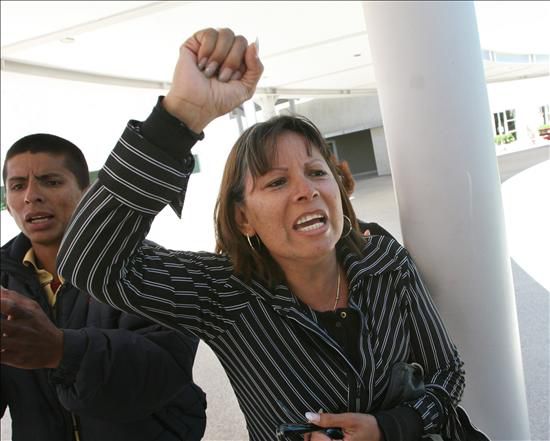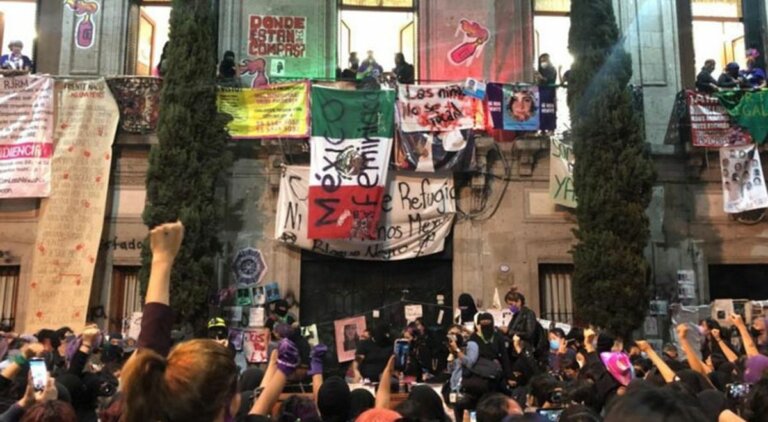By Lydia Cacho
December 20, 2010
[Spanish original]
Translated by Scott Campbell
I received a message on Thursday: “It’s December 16, they murdered Marisela Escobedo. What do we do now, Lydia?” The shock was immense; I knew Marisela, an admirable woman, as one of the mothers and sisters of women who for more than a decade have dedicated their lives to getting to the bottom of the crimes that have snatched their loved ones away from them.
The day that her sixteen-year-old daughter Rubí turned up dead, Marisela and her family knew that the killer was her boyfriend, Sergio Rafael Barraza Bocanegra. He himself admitted to having killed her “out of jealousy.” Ever since, Marisela had devoted her days and nights to tracking down evidence like the best criminologist (which she wasn’t); to finding witnesses and corroborating facts like the best prosecutor (which she wasn’t). Like a force of nature in the face of every failure of the justice system, Marisela and her lawyers knocked on doors that never opened. And so, with that closed door as a symbol of what has happened to Mexican society, an assassin shot Marisela three times in front of the state government building. Two days later, while Governor Duarte gave vacuous speeches of indignation, criminals burned down her husband’s business and kidnapped her brother-in-law.
Who would dare to murder a known human rights defender in front of the state government building where there are cameras? Who would dare, in such a well-publicized case, to go after the husband? Common criminals who over time have learned that the inefficiency of the state is always on their side would dare. A man who was released from jail and who had made death threats against Rubí’s mother would dare. He who knew there wouldn’t even be an arrest warrant issued for him would dare. Those who sensed that the governor would be distractedly talking instead of immediately protecting Marisela’s family would dare.
Perhaps the great tragedy for this country is that a good part of civil society: activists and human rights defenders, carry out their work thinking it is a collaborative effort with the state, that in spite of the criticisms there is a shared goal: a better country. But in reality, the shared goal is between the criminals and organized crime and the Mexican state. They know that while blood runs through the streets, politicians, entertained in their games of gossip behind the closed door, will send condolences through the media or on Twitter. Meanwhile, the criminals consider human rights defenders a threat, but not the state.
Mothers and fathers continue forsaking everything to pursue the memory of their dead, they follow the footprints of the rapists, murderers, gunmen, narco-traffickers, dealers or police who, banking on this impunity, go ahead and exterminate their girlfriends, wives, friends, employees, slaves or strangers. And they kill them because they want to and because they can. Because, for decades, the government of Chihuahua and its prosecutors ignored the growing violence, colluded with the offenders, brushed off as crazy the mothers who shouted for the lives of their daughters, discredited and closed the door in the faces of the human rights activists who demanded that the state do its job, to create the conditions to reduce poverty, to promote education, to create a safe city.
I’ve been traveling to Chihuahua for 15 years; I’ve documented the disgraces of the bad and the power of civil society. I marched across the bridge and the parks alongside courageous women like Marisela. I learned to keep believing in spite of everything; I discovered what a mother is capable of when her daughter has disappeared, and I learned that we are all in a small way the mothers of all of Mexico’s girls. Never in my entire life have I seen a community so capable of surviving pain, so united in spite of their differences, so strong as to never give up, as Chihuahua and Ciudad Juárez. In this land I’ve met the most courageous women, the most supportive men, poets and academics, journalists and workers. Drying tears with newspapers, with hands joined, no one will give up in Chihuahua – that was made clear during Marisela’s burial. Beyond the indignation, the rage, the desperation of this case, the question is: When will the rulers of Mexico have the courage and strength of these women?



